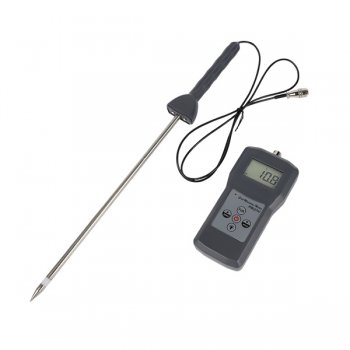How to Make Use Of a Moisture Meter to Discover Hidden Water Damages in Your Residential property
How to Make Use Of a Moisture Meter to Discover Hidden Water Damages in Your Residential property
Blog Article
The Ultimate Overview to Moisture Meters: A Comprehensive Introduction and Just How They Can Save You Money
In the realm of structure maintenance, building and construction, and various industries, the value of precisely gauging moisture levels can not be overemphasized. Dampness meters work as important devices in discovering and monitoring moisture material in materials, helping in preventing pricey damages and making certain the top quality of products. Comprehending the subtleties of various types of moisture meters, their applications, and the possible cost-saving advantages they supply can be a game-changer for businesses and professionals alike. Finding just how these devices can not only streamline processes but also contribute to monetary cost savings is a journey worth embarking on.
Kinds of Moisture Meters
Different types of moisture meters are available for different applications in numerous markets. One common kind is the pin-type wetness meter, which gauges the electric resistance between two pins put into a material. This kind appropriates for wood, drywall, and various other structure products. Pinless dampness meters, on the various other hand, use electro-magnetic sensor plates to scan a larger location without creating damages to the material's surface area. These meters are ideal for swiftly evaluating dampness degrees in large locations such as wall surfaces and floorings.
Moreover, there are also specialized wetness meters designed for details materials like hay, grain, or dirt. These meters give precise moisture analyses tailored to the distinct homes of the material being examined. Infrared dampness meters gauge the thermal buildings of a material to determine its wetness content non-invasively, making them useful for applications where pin or pinless meters might not appropriate. Understanding the various kinds of wetness meters offered can assist industries choose the most ideal device for their details wetness measurement needs.

Advantages of Making Use Of Moisture Meters

Moreover, utilizing dampness meters can lead to raised power efficiency. In farming settings, dampness meters play a crucial function in enhancing plant returns by making it possible for farmers to keep an eye on soil dampness degrees and make educated irrigation decisions.
Just How to Choose the Right Moisture Meter
Choosing the proper moisture meter includes considering crucial elements such as product compatibility, measurement range, and calibration accuracy. When selecting a dampness meter, it's necessary to make sure that the meter is suitable for the details product you will be testing. Different materials have varying electrical homes that can impact dampness analyses, so selecting a meter made for your product is crucial for precise outcomes. In addition, take into consideration the measurement series of the moisture meter. Guarantee that the meter can identify wetness degrees within the range required for your applications. Calibration precision is an image source additional important element to bear in mind (Moisture Meter). Choose a moisture meter with dependable calibration to make certain precise and consistent readings. Some meters might call for regular calibration adjustments, so comprehending the calibration procedure is very important. By very carefully evaluating these factors, you can pick a dampness meter that fulfills your requirements and gives precise wetness measurements for your tasks.
Correct Techniques for Moisture Meter Usage
To make sure accurate moisture readings and take full advantage of the effectiveness of a wetness meter, utilizing appropriate strategies is essential. When utilizing a pin-type moisture meter, insert the pins or probes into the product being examined until they make complete call. By complying with these correct strategies, users can depend on their wetness meter to offer credible moisture levels, aiding in avoiding pricey damages or guaranteeing top quality in numerous applications.

Cost Financial Savings Via Moisture Meter Applications
Exactly how can the calculated use of dampness meters cause substantial expense savings across different sectors? Moisture meters play an important function in cost savings by stopping prospective damages and guaranteeing quality assurance in various markets. In the farming industry, moisture meters help in identifying the optimum time for harvesting plants, stopping excess or over-drying moisture that can influence the end product's top quality. This exact surveillance assists farmers prevent unneeded losses and optimize their return.

Furthermore, in the food handling market, dampness meters are essential for checking product quality and making certain conformity with safety laws. By properly measuring moisture web content check it out in foodstuff, suppliers can stop spoilage, preserve quality, and lower waste, resulting in substantial price savings. In general, the critical application of wetness meters is a useful financial investment that can result in substantial expense decreases and improved effectiveness throughout various markets.
Final Thought
To conclude, dampness meters are beneficial devices for determining and discovering dampness degrees in various products. By making use of the right wetness meter and complying with proper methods, users can effectively stop costly damages caused by excess dampness. Purchasing a quality dampness meter can cause considerable expense financial savings in the future by identifying possible issues early and making it possible for timely remediation. Inevitably, moisture meters are vital instruments for keeping the stability and longevity of products and structures.
Moisture meters serve as crucial tools in discovering and keeping an eye on moisture content in materials, assisting in preventing pricey problems and ensuring the high quality of products. Infrared wetness meters determine the thermal residential properties of a material to determine its dampness content non-invasively, making them beneficial for applications where pin or pinless meters might not my explanation be suitable.Dampness meters use vital benefits in properly assessing and keeping track of dampness levels in diverse materials and atmospheres. In agricultural settings, moisture meters play an important duty in enhancing crop yields by allowing farmers to keep an eye on soil wetness degrees and make notified watering decisions.In final thought, dampness meters are important devices for discovering and measuring dampness degrees in different materials.
Report this page